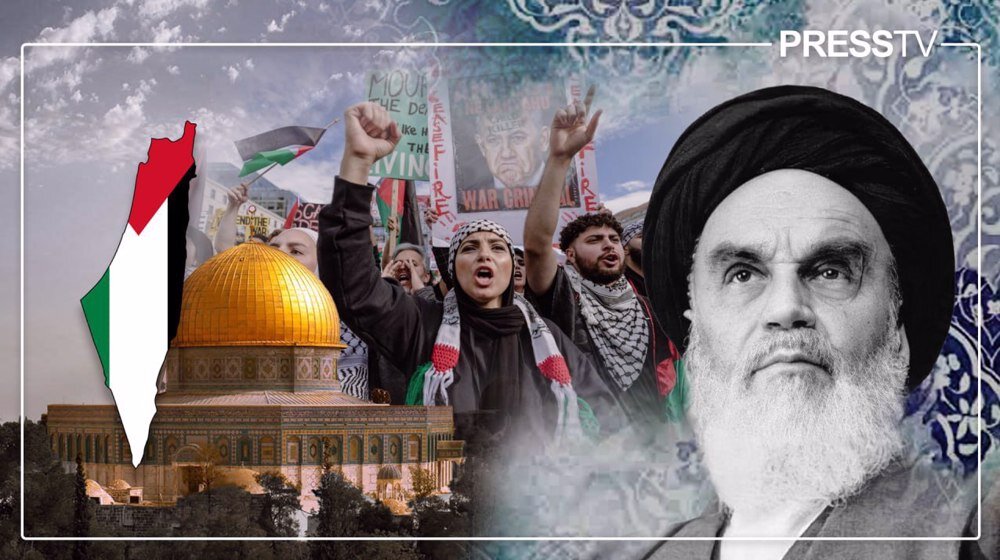Imam Khomeini and the occupied Palestine

TEHRAN – One of Imam Khomeini’s most enduring legacies is his pivotal role in placing Palestine firmly back on the world’s map.
The former Iranian monarchical system under Mohammad Reza Pahlavi maintained highly favorable policies toward the Israeli regime and consistently opposed the cause of the oppressed Palestinians.
At the time, this stance was welcomed across the Arab world. Pahlavi’s views found appreciation among Arab leaders, many of whom adopted similar positions.
Then came an Imam in 1979, who led the Islamic Revolution, declaring that today our focus is Iran, and tomorrow: Palestine.
In response, the Arab world drastically reversed its position toward Iran at the time, insisting that Palestine was solely an Arab matter and had no relevance to non-Arab nations.
Imam Khomeini, however, envisioned a different path; one in which Palestine, abandoned by international law, could only be liberated from Israeli occupation through some form of resistance.
From an Islamic perspective, the al-Aqsa Mosque, the third holiest site in Islam, remains under Israeli military occupation in al-Quds (Jerusalem).
The 1979 revolution was, after all, an Islamic Revolution, and Imam Khomeini remained committed to his pledge on Palestine.
This commitment was enshrined in the new Iranian constitution, which asserted the Islamic Republic’s duty to stand with the oppressed.
Over time, further legislation reinforced this responsibility.
These laws ensure that any Iranian government, regardless of who leads it, cannot ignore the plight of the Palestinian people.
During the 1980s, Lebanon also endured Israeli occupation, notably when Israeli tanks reached the Presidential Palace in Beirut.
In response, Iran, under Imam Khomeini’s leadership, supported resistance against the Israeli aggression. Iran pledged assistance if those under Israeli oppression sought help.
This doctrine, later advanced under Imam Khomeini’s successor, Ayatollah Seyyed Ali Khamenei, led to armed resistance from Lebanon and Gaza against the Israeli occupation.
The emergence of Hezbollah in Lebanon ultimately resulted in the successful expulsion of Israeli Occupation Forces (IOF) in 2000.
In Gaza, a U.S.-backed campaign of genocide has sought to destroy Palestinian resistance, exposing the brutal atrocities committed by the Israeli regime, particularly against Palestinian children.
Yet, according to the American Intelligence Community, the Palestinian resistance in Gaza remains as resilient today as it was on October 7, 2023.
Other intelligence reports state that Hamas, despite the Israeli regime’s vows to eliminate it, has doubled its number of fighters in the past 20 months.
In contrast, the Palestinian Authority, indirectly highlighted by Imam Khomeini’s school of thought as an example of failed reliance on the international community, has remained ineffective.
The PA, headquartered in the occupied West Bank, continues to await foreign intervention amid a record surge in illegal Israeli settlement expansion.
A point may soon arrive where the scale of these settlements forces the PA to abandon Ramallah and seek refuge abroad, leaving indigenous Palestinian land behind.
Israeli ministers have made their intentions clear: they aim to Judaize Gaza, occupied al-Quds, and the West Bank—regions they describe in biblical terms.
Today, armed resistance is emerging in the occupied West Bank, particularly among younger Palestinians who are reconnecting with their national, Arab, and Islamic identity.
Palestinians in Gaza and the West Bank refuse to capitulate. They would rather die in their homes than endure another Nakba.
This steadfastness is evident before our eyes on television screens every day.
Imam Khomeini established the last Friday of the holy month of Ramadan as International Quds Day. Since then, mass street protests have spread worldwide to mark the occasion.
“Muslims across the world should regard Quds Day as a day when every Muslim is required to join. It is the oppressed people’s day,” Imam Khomeini declared.
What some Arab rulers, in particular the new government in Syria, fail to grasp is that Israeli occupation knows no borders. Its ambitions extend until the “Greater Israel Project” is realized.
“Everyone should realize that the world superpowers’ aim in creating Israel does not end with the occupation of Palestine. They plan, God forbid, to extend Palestine’s fate to all Arab countries,” Imam Khomeini warned.
This is the ultimate goal of the Israeli occupation, and it should deeply concern Arab rulers.
One man changed the course of the Palestinian struggle.
Leave a Comment